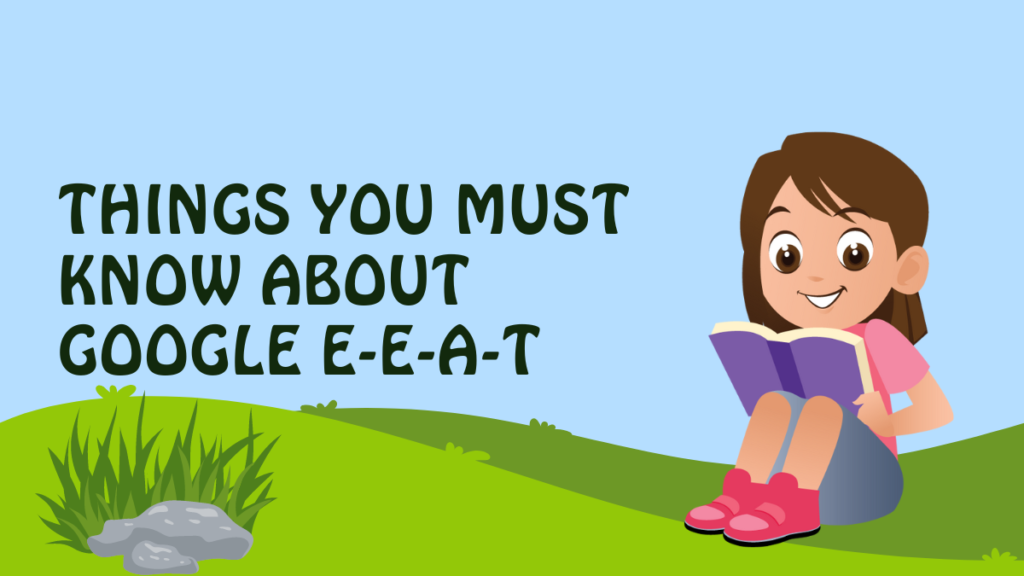Welcome to the world of Google E-E-A-T! If you’re wondering what that mysterious acronym is all about, buckle up. It’s a set of guidelines that Google uses to figure out if your website is awesome or just “meh.” Think of E-E-A-T as your secret weapon for making your blog posts shine in search results, so readers flock to them!
What exactly is Google E-E-A-T?
E-E-A-T stands for:
- Experience: Does the content creator demonstrate firsthand experience in their topic area?
- Expertise: Does the writer show they really know their stuff?
- Authoritativeness: Is the content creator and their website seen as a go-to source for information on that topic?
- Trustworthiness: Does your content make people feel safe and confident relying on the information you provide?

Why Does E-E-A-T Matter?
Imagine Google as a giant librarian. It wants to organize all the world’s information and point users towards the most helpful stuff. E-E-A-T helps Google sort the good from the bad. It’s how Google decides if your blog post is the perfect answer to someone’s question… or if they need to keep looking.
How to Enhance Your E-E-A-T: A Breakdown
Let’s explore each E-E-A-T element and how to boost yours:
1. Experience
- Example: Let’s say you’re writing about gardening. Have you actually grown vegetables or flowers? Sharing photos of your garden and describing your triumphs (and failures!) helps Google recognize your firsthand knowledge.
2. Expertise
- Example: If you’re a financial advisor, don’t just write about money – mention your credentials and background in the field. Have you worked with clients for years? Share those details!
3. Authoritativeness
- Example: Getting other bloggers to link back to your website (these are called “backlinks”) builds your authority. Think of them like votes of confidence from other websites. Plus, if you write articles for well-known sites, this also adds major authority points!
4. Trustworthiness
- Example: Think of your website like a storefront. Does it look trustworthy and secure? Make sure your site has an “About” page, clear contact info, and uses the “https” protocol for security.
The Case of YMYL Content
“YMYL” stands for “Your Money or Your Life.” These topics directly impact someone’s health, finances, or happiness. If you’re writing about these subjects, E-E-A-T is even more important! Google holds YMYL content to an extra-high standard.
- Example: A blog post about “the best retirement plans” needs stronger demonstrations of expertise and trustworthiness than one about “cute cat toys.”
Additional E-E-A-T Tips
- Write in depth: Don’t just skim the surface! Longer, more detailed posts usually demonstrate E-E-A-T better than short ones.
- Fact check: Be sure your info is accurate! If you spread misinformation, that’s a red flag.
- Cite sources: Did you get info from a research study? Link to it!
- Update old content: Things change over time, so make sure your posts don’t become outdated.
FAQs
- Is E-E-A-T a ranking factor? Not directly, but it plays a big role in Google’s overall assessment of your site.
- Can I still rank well without E-E-A-T? It’ll be much harder, especially with competitive keywords.
- How long does it take to see E-E-A-T improvements? Don’t expect overnight changes, but be consistent!
- Do I need to be an expert in everything? Nope, but focus on the topics you truly know well.
- What if my topic isn’t YMYL? E-E-A-T benefits all websites!
Summary
Google E-E-A-T matters. It’s a reminder that quality content is about more than keywords. By focusing on experience, expertise, authority, and trust, you’ll create content that both readers and search engines love.
Is your website E-E-A-T ready? Leave a comment with your biggest takeaway from this post!



